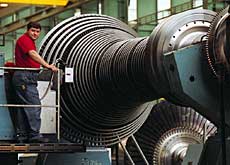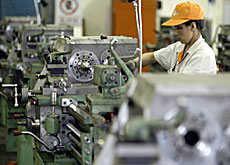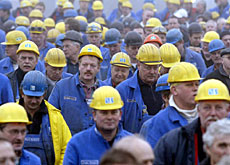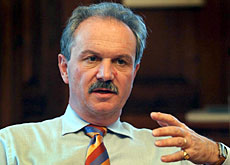Exports boost Swiss machinery sales

Booming exports have lifted orders and sales for the Swiss machinery sector during the first half of 2004 after three slow years.
But the sector’s umbrella organisation, Swissmem, said the industry needed to overhaul its work practices to remain competitive.
Orders increased by 11.7 per cent during the first six months of the year over the same period in 2003. Sales gained seven per cent.
A 17.2 per cent rise in orders from abroad compensated for a sluggish domestic market, where orders dropped by 3.4 per cent.
Asian sales were the biggest factor influencing revenue growth, gaining over 25 per cent.
Recovery underway
“Despite the positive-looking overall picture, one should not forget that the sector is still in a recovery phase… and in the domestic market the will to invest is still tepid,” said Swissmem in a statement.
The umbrella organisation said sales were likely to continue to grow – albeit at a slower rate – during the second half of the year.
Swissmem director Thomas Daum added that the machine industry was still recovering and that the recent increase in oil prices could have a negative influence on the economic outlook for the sector as a whole.
The latest economic barometer by the KOF Institute for Business Cycle Research, which polls 6,000 companies, confirmed on Wednesday that economic growth would slow towards the end of the year.
Increasing productivity
Swissmem said it was important for the machine industry to look for ways to increase productivity and become more competitive.
Measures suggested include changing work practices for Swiss employees and shifting production abroad.
Johann Schneider-Ammann, president of Swissmem, told swissinfo that the aim was not necessarily to make employees work longer hours.
“We want more flexible work practices,” he said. “We need to be able to make employees work more for specific projects over a short period when necessary.”
Schneider-Ammann says he wants to start negotiations with union representatives during their next round of talks over the sector’s collective bargaining agreement, which is due to be renewed in 2006.
The unions have so far rejected any moves to extend working hours. They argue that employees in Switzerland spend more time on the job than many of their European counterparts.
Shifting production
According to Swissmem, international competition is also forcing a growing number of Swiss companies to shift their production abroad.
A recent report, conducted by the Institute for Technology Management at St Gallen University, found that a majority of firms had already moved some manufacturing to subsidiaries in eastern Europe, Asia and the United States.
Most of the more than 100 companies surveyed are active in the machine, automobile, electronic, chemical and pharmaceutical industries, and posted annual turnovers ranging from SFr150 million ($121 million) to SFr1 billion.
More and more medium-sized enterprises were found to be following the trend towards shifting production abroad. Companies said they were moving production lines outside Switzerland to save costs but also to establish a greater presence for themselves in emerging markets.
“This means we are not creating jobs in Switzerland, but losing them,” said Schneider-Ammann.
“But if we hadn’t created production sites outside of Switzerland, even more jobs might have been lost.”
swissinfo with agencies
Swiss machinery exports increased by 10.6% during the first half of the year.
The biggest increases were in exports to Poland (+32.4%), Asia (+26.9%), the Czech Republic (+19.9%) and the European Union (+6.5%).
Orders also increased by 11.7%.
The Swiss machinery sector is the country’s biggest employer.
In March, over 300,000 people worked in the industry.
Exports from the machinery sector totalled around SFr30 billion during the first six months, representing more than 40% of Swiss sales abroad.

In compliance with the JTI standards
More: SWI swissinfo.ch certified by the Journalism Trust Initiative




You can find an overview of ongoing debates with our journalists here. Please join us!
If you want to start a conversation about a topic raised in this article or want to report factual errors, email us at english@swissinfo.ch.